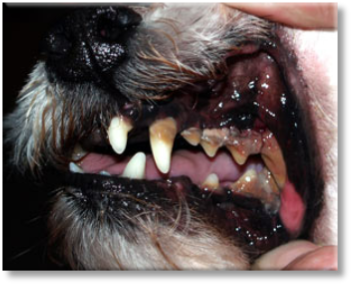

JSK Software © 2011

Why feed raw?
Because you want your pet to live the longest, healthiest life possible
It's what our pet carnivores evolved to eat. No man-made diet can hope to compare to fresh natural whole food. The benefits of a whole natural diet include improvements in multiple areas. Most people report significant improvements in all areas after switching to a whole natural diet. One of the simplest but most profound improvements is in dental health. Chewing whole raw meaty bones scrubs teeth better than brushing and flossing. The periodontal disease suffered by most commercially-fed animals leads to heart, kidney, and liver disease, in addition to the painful gingivitis and tooth root abscesses typical of the kibble-fed pet. Studies have shown that over 80% of pets have periodontal disease by the age of 2. Foul breath is one of the outward symptoms of this deadly disease from which millions of commercially-fed pets suffer and die.
Raw fed pets typically have shiny teeth and healthy mouths. Because of this, they are at a lower risk of heart, liver, and kidney disease, to name but a few.
People who switch to raw feeding are often amazed at the difference in their pets' coats. The require less frequent bathing, smell better, and have softer thicker fur. Dogs and cats that had terrible skin issues before raw feeding often regrow their hair and heal from the chronic hot spots and infections.
Improved temperament and attitude is another reason to switch to raw. Inappropriate diets in dogs can lead to hyperactivity, difficulty in focusing, and other behavioral and training problems. Dogs switched to raw typically have more energy and endurance than before, but are calmer and easier to train.
Dangers of Raw Meat
Many people are concerned about the dangers of bacteria and parasites when feeding raw meat, eggs and dairy to our dogs.
Remember that wolves and dogs evolved to be able to cope with bacteria found in carrion and meat that has been buried for long periods. Their digestive systems are designed to move food through quickly, before bacteria has a chance to proliferate or cause problems. Bacteria such as salmonella are found in the digestive systems of as many as 40 percent of healthy dogs, including those fed only commercial foods. While these bacteria can affect dogs, it would be unusual for a healthy dog to have any problems with the bacteria found in raw meat and other products considered fit for human consumption.
There are a few parasites that might be a cause for concern, though freezing meat for a period of three weeks will destroy most of them (freezing has no effect on bacteria).
You may want to consider feeding a cooked diet to your dog if you’re concerned about the possibility of problems from raw meat, your dog's immune system is compromised due to illness or medication, or your dog just doesn’t seem to do well on a raw diet.


Six year old Koko had been on kibble and treats all his life. Despite annual visits, his veterinarian had never recommended any dental care.
Six teeth were extracted after this photo was taken.
Colby is the same age as the dog above, and has never had a professional teeth cleaning either.
He has been fed a prey-model raw diet since the age of 10 months.